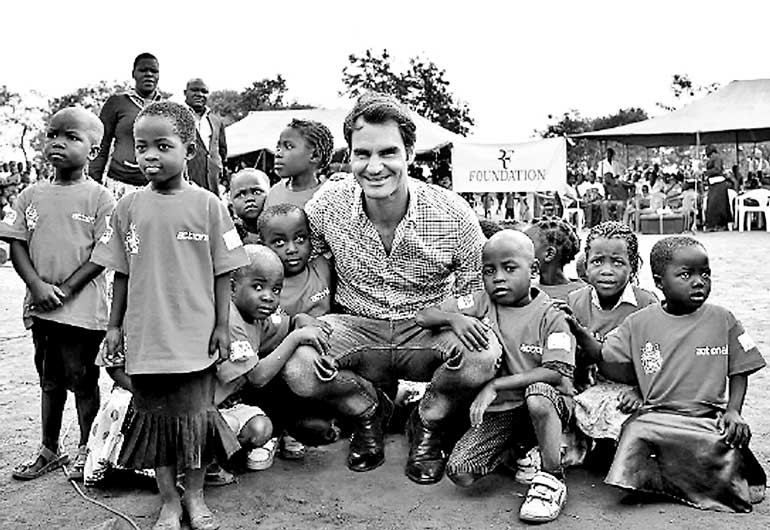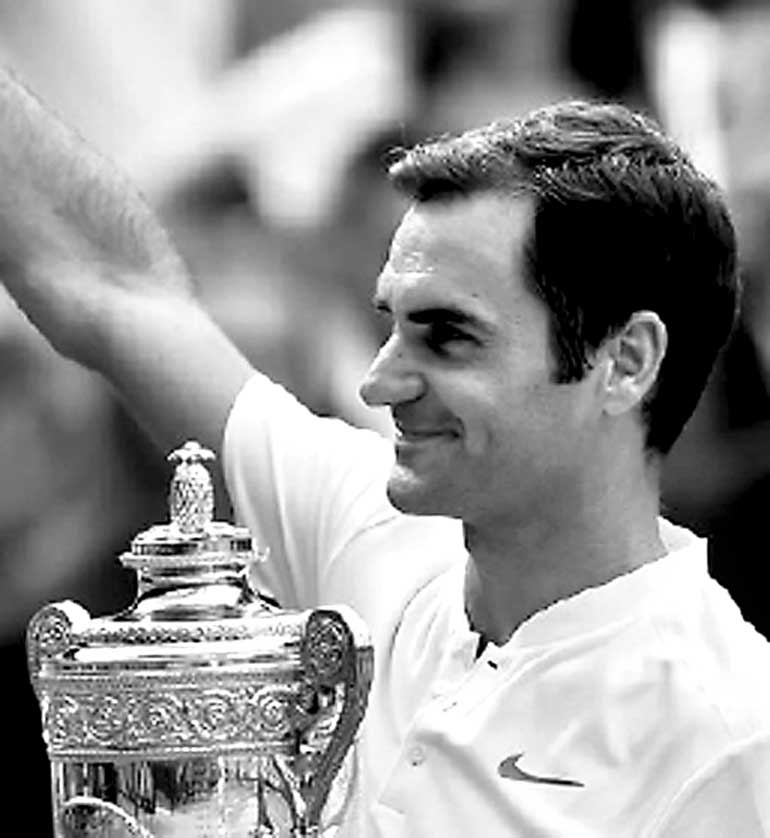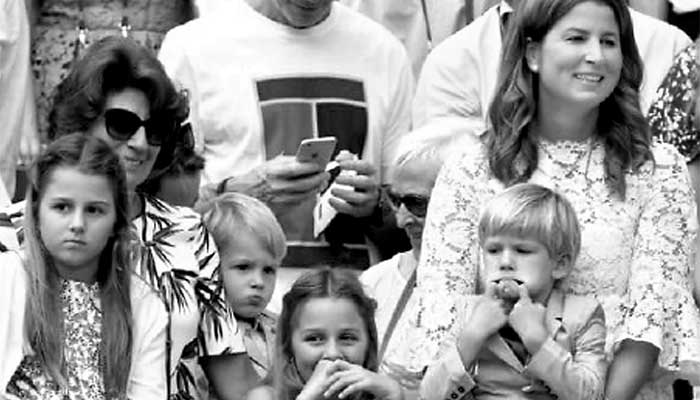Monday Feb 16, 2026
Monday Feb 16, 2026
Saturday, 22 July 2017 00:23 - - {{hitsCtrl.values.hits}}
By D.C. Ranatunga
Tennis enthusiasts the world over watched Roger Federer winning the Wimbledon Championship 2017, creating a new record being the first player to win Wimbledon for the eighth time. Earlier Pete Sampras had the record with seven wins.
With less than a month to go for his 36th birthday, Federer is the oldest to win the Wimbledon. To have gone through the tournament without dropping a set is a single match is yet another ‘special’. This is also his 19th Grand Slam title.
Knowing about my interest in tennis, two months back my grandson Binu gifted me a book on Federer. Titled ‘Fedegraphica’, the well-illustrated book is ‘A Graphic Biography of the Genius of Roger Federer’. It is edited by Mark Hodgkinson, a tennis author and journalist based in London.
Since we read all the time about how he plays, how he wins matches, how he reacts, the readers may like to get a glimpse of his private life.
The book opens with a quote from John McEnroe, one time tennis champion: “You’re watching true genius. He’s the greatest player that’s ever lived.”
 Among amazing kids
Among amazing kids
The book records Federer’s entire career starting off with a chapter titled ‘Crazy Maniac’. Flipping through the pages I jumped to the last chapter, ‘The Rock, the Pram and the Millionaire-in-waiting’ discussing his out-of-court life.
‘A travelling circus’ is how Federer had once described his life on the road. “So one of the first things he does on being shown the week’s hotel suite is to arrange what you might call ‘The Children’s Corner’. Moving from one hotel to another could potentially be bewildering for the Federers’ children, so they ensure that one part of every room they stay in is always the same. The arrangement of toys helps the children feel they are in a familiar environment. Structured days and regular daily routines also allow them to make sense of the nomadic lifestyle. Even when Federer is not with the children, because of a match, a practice session or some other commitment, he will know what they are doing all the time. When Federer is around he is very much a hands-on father,” writes Hodgkinson.
 Roger Federer won the Wimbledon Championship 2017, creating a new record being the first player to win Wimbledon for the eighth time
Roger Federer won the Wimbledon Championship 2017, creating a new record being the first player to win Wimbledon for the eighth time
While Federer and wife Mirka have the means to travel regularly by private jet and employ nannies, those luxuries do not necessarily mean that family life out on the Tour runs in a straightforward way. Boris Becker is quoted as saying, “Yes, Roger travels first class, if not his own jet, but I am sure there are challenges with the kids adapting to time changes and also to climate changes.”
Highlighting that domestic duties are Federer’s routine, author Hodgkinson writes: “In between his Centre Court performances at Wimbledon, for instance, he will clean the house that he rents for the tournament. ‘It’s part of the grind, you know’, Federer said, and the image of him vacuuming the carpets or putting the wheelie bins out for collection caused considerable amusement in certain quarters. Some could not quite deal with the idea of the greatest tennis player in history doing something so mundane. However, these chores do not intrude on Federer’s preparations and training, and Mirka ensures that he is sufficiently rested. Sleep is important to every athlete, even to a father of four.”

The Telegraph (London) carried this picture of Roger Federer’s kids with mum watching dad collecting the trophy at Wimbledon last Saturday.
Federer is ranked as ‘the most interviewed sportsman’. He is able to speak four languages – English, German, Swiss-German and French. This means his post-match media commitments at Grand Slam tournaments can last an hour or more for a routine match, and up to three or four hours if he wins the tournament.
Concern about children
Federer is concerned with the welfare of children in the world. He established the Roger Federer Foundation in 2003 with the target of improving the lives of a million children. It has come over quarter of the way after helping children in Africa, Zambia, Botswana, Namibia, Zimbabwe and Switzerland.
Federer’s decision to focus on Africa has something to do with his heritage. His mother is South African, his parents had met in that country and they would return there for family holidays. “As a child, when he went on holiday to South Africa and saw the poverty, he realised that not everybody is raised with the same privileges that he had. It’s all about the kids and improving their lives,” says RF Foundation chief executive. Stressing that Roger is very involved with the Foundation not with his time, but also with his heart, the CEO adds: “It’s something that is part of his personality and part of his character. That’s why this is so credible – this is not an image thing.”
The CEO remembers how Federer did a trip to Malawi after he lost the 2015 Wimbledon final to Novak Djokovic. He spoke of how it was possible to feel sad and sentimental. But he also feels refreshed by these trips and grateful to have ‘spent time with those amazing kids’.
He relates a story of how Federer makes the children laugh. “Once he held a banana under his nose, pretending it was a moustache that curled up at the ends. Then the banana was turned upside down so it became a sad face. More giggling from the kids. Roger just feels so at home and so alive out there and has a good time with the kids. The funny thing is that the kids don’t know who Roger is.”